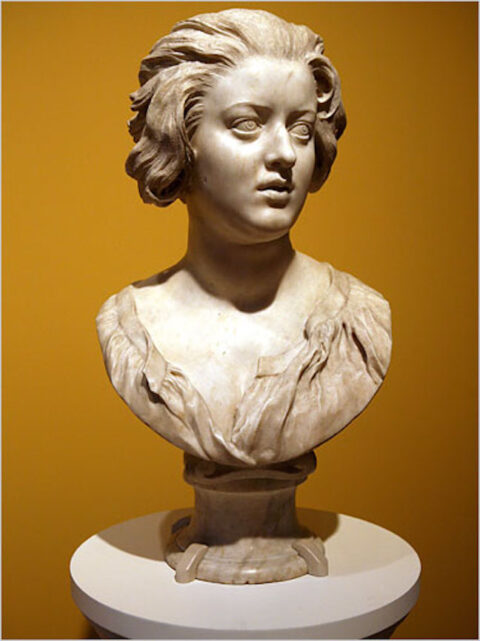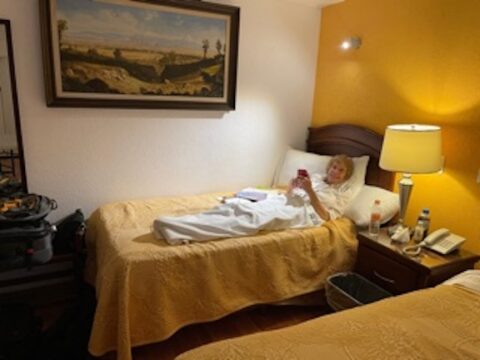Bernini In Love
Even as Constanza’s astonishing face emerged from the marble – the open eyes, the parted lips, the full forehead — part of him longed to stab her with the point of his chisel, scar her cheek with his rubbing stone. He wanted to hurt her, to stop her, somehow, from being so overwhelmingly complete in herself. But she eluded him — not just in the statue, which he worked on alone, day after day, but in the tumble of tapestries where she lay naked and laughing on his studio floor, in the silken drapes of his bed where they twined like snakes, in the galleries where she knelt at the papal reception, lashes dropped, her hand resting lightly on the arm of her husband. No matter how often he had her he could never have her, not the way he longed to have her — not until the day he saw his brother slip half-dressed from her house at dawn. Then at last the violence shot from his fingertips, freed. He raised an iron bar to smash the statue before he realized he could not, would not hurt her that way, but would instead chase his frightened brother through the empty streets, smash open their mother’s door and tear through their mother’s house before the screaming boy found sanctuary in the Basilica. He would then drop the iron bar and thrust a few loose coins instead into the palms of the halfwit servant who, ever obedient, went straight to Constanza and with a razor slashed her lid to lip.
And then? Constanza lived, his brother lived, Bernini lived himself, prosperous, successful, soon to be married, soon to be the father of eleven … his servant, of course, was sentenced to death … and the statue? Quickly sold to a friend then sold to a duke then sold to a prince and now Constanza glows alone in the Bargello Museum in Florence. She is as tousled and dewy and rounded as ever. The marble has aged strangely over the centuries, however. There are narrow grooves in her cheek and brow where there were no grooves before, the bridge of her nose is oddly bruised, there is a troubled shadow between her wide eyes, and a claw mark down her throat that no one can account for.

The Bust of Costanza Bonarelli, a marble statue, wast created by Gian Lorenzo Bernini during the 1630’s. The piece is currently shown in the Museo Nazionale del Bargello in Florence, Italy.
* * * * *
Looking at a Desert Landscape Painting While Isolated with Covid
The mountain is so far away. Do I really have to walk there? Why? It will take days, maybe weeks, just to reach the first slopes. Days of tramping through mesquite and sage and thorn trees and rocks. And then what. Say I do get across the plain and make it as far as the foothills, what then? Mountains are meant to be climbed, I’ve never known why. Surely they could be seen as simply welcome barriers, embracing arms meant to keep us enclosed, safe in one place. Must everything be a challenge? Do all obstacles have to be overcome? Can’t they just be accepted for what they are — obvious no-nos? A child told No is punished if he persists, but the rest of us are expected to persevere. Why? Even if I do somehow cross the plain, scramble and scrape my way up the cliffs and glaciers and claw to the peak, what do I achieve? A view? A view of what? Another plain, another mountain off in the distance? Such a homely landscape, everything ochre, or rust, or charcoal. Soil like cornmeal. Not a blade of grass. Nothing green. The ridge in front of me is a dark mineral brown and the cleft I am to walk through (if I decide to walk through) is almost black. At least it’s not hot. I wonder if it will always stay six in the morning like this, the sun already risen but the shadows small. Will the day turn into noon or into some endless two-thirty? Will there be night—there would be stars here at night. Probably more stars than I have ever seen before in my life. I will have to sleep, if I sleep, with my arm over my eyes. I’ll be worried about snakes. Right now there is no sign of life, but there must be snakes. Scorpions. Coyote skulls. Maybe, down there in that far distant line of bare trees, there might even be people. A few strands of smoke are rising from the trees. Campers? Outlaws? Runaways? People, like me, stuck? There might be a river that I can’t see from here, or a spring of some sort. Water would be nice. I could bathe and wash my tired eyes. Maybe I will only go as far as the trees. Maybe someone there will help me. I wish I had a donkey! A donkey would be a companion, a comfort, a help; I could rest my hand on its rough mane as we walked. Maybe one is grazing unseen somewhere, waiting for me. Maybe if I look hard enough, he will emerge.
